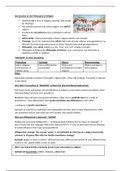Summary
Summary Philosophy of Religion
- Course
- Philosophy 214,244 (PHIL214)
- Institution
- Stellenbosch University (SUN)
This document provides an entire summary of the course, Philosophy of Religion. It starts with the concept of Philosophy of Religion and then gives a comprehensive and critical view of the Cosmological and Ontological Proof for the existence of God. This is followed by a look at three answers to th...
[Show more]



